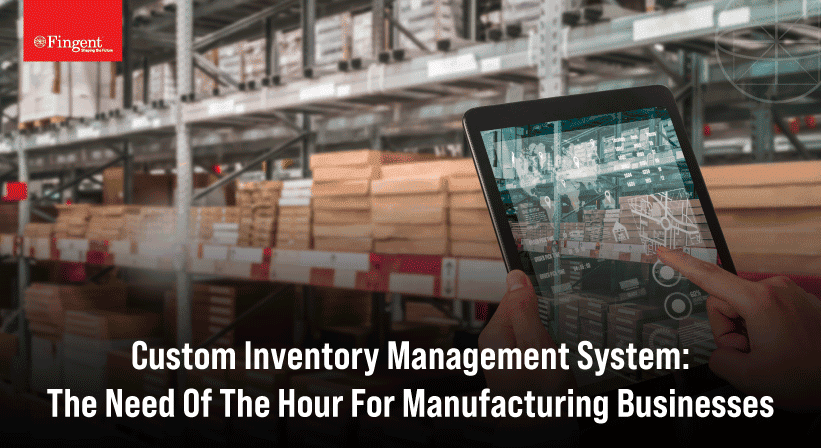The Game-Changing Role of Custom Inventory Management in Supply Chain
Supply chain management is a complex web of processes that involve the seamless coordination of procurement, production, distribution, and more. Among these, inventory management stands out as a pivotal aspect that can make or break the entire system.
Maintaining control over inventory is like keeping a careful eye on the pieces of a chessboard. Every move counts, and any miscalculation can have far-reaching consequences. Imagine trying to play chess without knowing the current position of your pieces or your opponent’s – chaos would ensue.
In this blog, we delve into the common challenges faced in supply chain management concerning inventory control and explore the merits of building a custom inventory tracking system to address these issues.
Diving into the Nuts and Bolts: Common Inventory Management Challenges
1. Running Out and Piling Up: The absence of real-time tracking often leads to discrepancies between recorded and actual stock levels. This discrepancy can result in stockouts or overstock situations. Have you ever reached for your favorite snack only to find an empty bag? That’s what a stockout feels like for businesses – missed sales and disappointed customers. On the flip side, having too much inventory is like buying more snacks than you can eat – it leads to unnecessary costs and storage challenges.
2. Data Silos: Traditional inventory systems are often isolated, creating data silos that hinder communication and collaboration across different departments. This lack of cohesion can lead to inefficiencies and errors.
3. Forecasting Difficulties: Accurate demand forecasting is challenging without real-time insights. Businesses often struggle to predict market trends and consumer demands, leading to suboptimal inventory levels and increased holding costs.
4. Manual Processes: Relying on manual processes for inventory management is not only time-consuming but also prone to errors. It is like trying to juggle a dozen eggs without a basket. This can result in discrepancies between recorded and actual inventory levels, leading to operational inefficiencies.
5. Lack of Scalability: Many off-the-shelf inventory management solutions may lack the flexibility needed to adapt to the unique demands of a growing business. This lack of scalability can hinder long-term success.
How Can an Inventory Tracking System Help?
A custom inventory tracking system serves as a key strategic tool, providing businesses with a competitive edge in managing inventory complexities. Let’s now explore the concrete benefits of implementing such a system and its targeted solutions to common supply chain challenges.
1. Real-time Visibility:
An effective inventory tracking system grants you real-time visibility into your stock levels. This transparency enables timely decision-making, reducing the risk of stockouts or overstock situations. By knowing exactly what is in your inventory at any given moment, you can optimize stocking levels and respond swiftly to changes in demand.
2. Cost Savings:
A well-designed tracking system allows you to minimize carrying costs by preventing excess inventory buildup. By optimizing stock levels and improving order accuracy, you can reduce holding costs, warehouse space requirements, and the costs associated with expedited shipping due to stockouts.
3. Enhanced Accuracy:
Manual tracking methods are prone to errors, leading to discrepancies in stock levels and financial records. An automated inventory tracking system eliminates human errors, ensuring accuracy in your records. This not only improves financial reporting but also builds trust with your customers and stakeholders.
4. Efficient Order Fulfillment:
An inventory tracking system streamlines the order fulfillment process by providing insights into available stock, order status, and delivery timelines. This efficiency contributes to a positive customer experience and strengthens your business reputation.
Read more: Warehouse Management System: Business Applications and Case Studies.
Challenges Addressed by a Custom Inventory Tracking System
1. Stockouts and Overstock Situations
Challenge: Unplanned stockouts or excessive inventory can cripple operations and strain relationships with clients.
Solution: Real-time visibility allows for proactive inventory management, preventing stockouts and overstock situations. The system sends alerts when stock levels approach predefined thresholds, empowering you to take preventive action.
2. Manual Errors in Tracking:
Challenge: Manual tracking methods are prone to human errors, leading to discrepancies in records and financial reporting.
Solution: Automation eradicates the potential for errors, ensuring accuracy in tracking and reporting. This not only saves time spent on rectifying mistakes but also builds trust with stakeholders.
3. Inefficient Order Fulfillment:
Challenge: Slow and inaccurate order fulfillment can result in dissatisfied customers and harm your brand reputation.
Solution: An inventory tracking system provides real-time insights into stock levels, enabling efficient order processing. This leads to faster order fulfillment, improved customer satisfaction, and a competitive edge.
4. Lack of Data-Driven Decision Making:
Challenge: Without real-time data, decision-makers are forced to rely on intuition rather than insights.
Solution: The system’s data analytics capabilities empower decision-makers with actionable insights. This data-driven approach facilitates strategic decision-making and allows for quicker adaptations to market changes.
The Case for Custom Inventory Tracking
In supply chain management, precision and efficiency are vital for success. Off-the-shelf solutions may appear attractive, but investing in a custom inventory tracking system is a strategic imperative. Here’s why:
1. Precision Aligned with Your Unique Needs: Off-the-shelf solutions lack specificity, designed for a broad audience. A custom system is tailored to your unique operations, ensuring seamless alignment with your processes, from order fulfillment to warehouse management.
2. Real-Time Adaptability: Custom solutions offer real-time adaptability to changing market conditions, technological advancements, and industry standards. This agility ensures you stay ahead without being confined by pre-set functionalities.
3. Cost-Effective Scalability: Off-the-shelf solutions often come with unnecessary features or limitations, hindering growth. Custom inventory tracking systems offer scalable, cost-effective solutions, allowing you to expand or modify functionalities without unnecessary overheads as your business evolves.
4. Seamless Integration: A custom solution ensures seamless integration with your existing suite of tools, from ERP to CRM systems. This creates a unified ecosystem, optimizing workflow, enhancing data accuracy, and improving overall operational efficiency.
5. Enhanced Security: Generic systems employ a one-size-fits-all security approach, leaving businesses vulnerable. A custom inventory tracking system enables personalized security measures, safeguarding sensitive data and mitigating risks specific to your industry and operations.
6. Maximized User Adoption: The effectiveness of a system hinges on its user adoption rate. Custom solutions prioritize user experience, aligning interfaces with your team’s familiarity. This minimizes training requirements, facilitating a smooth transition and maximizing the efficiency of your inventory management system.
7. Tailored Reporting for Decision-Making: Unlike pre-packaged systems, a custom inventory tracking system allows you to tailor reporting functionalities. It ensures the data you receive is not just comprehensive but directly aligns with your business goals, providing precise insights for strategic decision-making.
Elevate Your Supply Chain with Fingent’s Custom Inventory Tracking Solutions
At Fingent, we’re your dedicated partner for supply chain excellence, specializing in crafting tailored inventory tracking systems. Our solutions seamlessly adapt in real-time, ensuring agility in dynamic market landscapes. With a focus on scalability without unnecessary costs, we seamlessly integrate with your systems for enhanced efficiency. Leverage our expertise in custom reporting for actionable insights, backed by a proven track record in diverse industries. Partner with Fingent for precise, adaptable, and scalable supply chain solutions.
Get in touch with us, and let’s talk.
Stay up to date on what's new

Recommended Posts

25 Jan 2024 Logistics B2B
The Manifold Benefits of Custom Fleet Management Software in Supply Chain
Cost, Compliance, Efficiency, and Manpower – These are the pillars on which a fleet management business stands. A compromise on any of these can mean the whole business topples with……

22 Nov 2023 B2B
Custom Inventory Management System: The Need Of The Hour For Manufacturing Businesses
In the competitive manufacturing world, being average won't secure a win. Businesses need technology to outperform competitors, reduce costs, and build a stellar reputation that echoes through the manufacturing jungle.……

15 Jul 2023 B2B
Exploring the Power of AI In Supply Chain
Artificial Intelligence (AI) evolved from a concept of science fiction to a transformative force that permeates our daily lives. From autonomous vehicles to voice assistants, AI has already made significant……

04 Feb 2022 B2B
Top Technologies That Will Help Tackle Supply Chain Challenges in 2022
The COVID-19 pandemic has created an imbalance between the supply and demand of the goods thereby disrupting the supply chain globally. That said, it has also amplified the need for……
Featured Blogs
Stay up to date on
what's new










